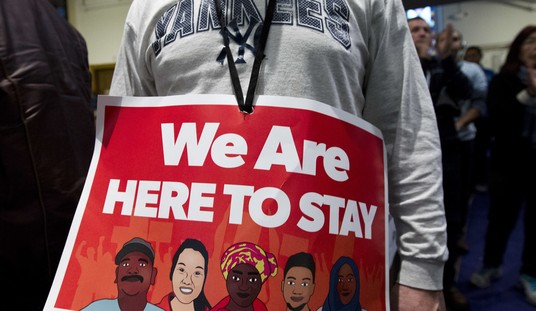II. Obama and His Democrats: Their Own Words and Ideas

Before we get to Obama’s policies, it’s important to lay the groundwork. Let’s look at his ideas.
Barack Obama is well-known for his polished oratory, his delivery off a TelePrompter of carefully prepared and vetted speeches. Unsurprisingly, these prepared texts generally seek to cast his ideas and programs as consistent with the American traditions of free enterprise, free markets, free people and free institutions. But there is a long history of mostly unscripted statements from Obama and his wife Michelle – which I supplement here with just a few choice examples from the party he commands – that reveal a consistent strain of his thinking that is hostile to private business and the private sector, favorable to redistribution of wealth, and collectivist in worldview. Together, they illustrate the rationalizations behind Obama’s policies.
A. Denigration of Work In the Private Sector
Begin with Obama’s values. Obama, for his own life, never wanted a job in the private sector, and always treated the idea as something to be looked down upon. As even the New York Times noted of his time after graduating college in the early 1980s, “[i]n his memoir, he says he had decided to become a community organizer but could not persuade anyone to hire him. So he found ‘more conventional work for a year’ to pay off his student loans.” Here’s how he described that work in Dreams of My Father, his 1995 memoir:
“Like a spy behind enemy lines, I arrived every day at my mid-Manhattan office and sat at my computer terminal.” His rationale? “I would need the money later, I told myself. Organizers didn’t make any money; their poverty was proof of their integrity.”
He expressed the same sentiment to his mother and then-girlfriend at the time: a “spy behind enemy lines …working for the enemy because some of the reports are written for commercial firms that want to invest in [Third World] countries.” In part, this was due to his prejudice against the life of the ordinary private sector worker:
“[Obama] always talked about the New Rochelle train, the trains that took commuters to and from New York City, and he didn’t want to be on one of those trains every day,” said Jerry Kellman, the community organizer who enticed Obama to Chicago from his Manhattan office job. “The image of a life, not a dynamic life, of going through the motions… that was scary to him.”
But partly it was also a matter of denigrating the entire idea that a private sector job could be a noble calling:
“I had my own office, my own secretary, money in the bank. Sometimes, coming out of an interview with Japanese financiers or German bond traders, I would catch my reflection in the elevator doors — see myself in a suit and tie, a briefcase in hand — and for a split second I would imagine myself as a captain of industry, barking out orders, closing the deal, before I remembered who it was that I had told myself I wanted to be and felt pangs of guilt for my lack of resolve.”
In a way, it’s even more damning of Obama that, according to David Maraniss’ latest biography, most of the details of this anecdote are untrue; Obama aspired to be seen as disdaining a life in the private sector. And his wife has echoed that disdain on the campaign trail, as Byron York noted earlier this year:
“We left corporate America, which is a lot of what we’re asking young people to do,” Mrs. Obama said at a campaign stop in Ohio in February 2008. “Don’t go into corporate America. You know, become teachers. Work for the community. Be social workers. Be a nurse. Those are the careers that we need. …”
The first lady still says that sort of thing. In a commencement speech at Oregon State University last week, she described how she once had a “corporate” job with “all the traditional markers of success: the fat paycheck, the fancy office,” but it left her unfulfilled. So she fled the business world — as did her husband — and she now urges others to leave as well.
Michelle Obama’s life after working in the private practice of law shows that she moved on to a series of jobs and positions with a symbiotic relationship with her husband’s political allies and political career – working for Mayor Daley; heading the Chicago office of a non-profit on whose board her husband sat, and to which he later directed taxpayer money; sitting on the board of a dance theater to which Barack Obama and his state Senate mentor steered more taxpayer money; handling “community relations” and minority contracting for a university and its hospital, which promptly doubled her salary when Obama was elected to the US Senate, after which he tried to steer them a $1 million earmark.
B. Delegitimizing the Private Sector’s Independence
Obama’s is not merely a disdain for working in the private sector – it is a deeper ideological commitment to delegitimize that sector as a force independent from the government. Obama touched off a firestorm in mid-July when he gave the following remarks (tellingly, at a speech in which he was not using a TelePrompter); it’s worth both reading them and watching the video to get the full context:
[L]ook, if you’ve been successful, you didn’t get there on your own. You didn’t get there on your own. I’m always struck by people who think, well, it must be because I was just so smart. There are a lot of smart people out there. It must be because I worked harder than everybody else. Let me tell you something – there are a whole bunch of hardworking people out there.
If you were successful, somebody along the line gave you some help. There was a great teacher somewhere in your life. Somebody helped to create this unbelievable American system that we have that allowed you to thrive. Somebody invested in roads and bridges. If you’ve got a business. you didn’t build that. Somebody else made that happen. The Internet didn’t get invented on its own. Government research created the Internet so that all the companies could make money off the Internet.
The point is, is that when we succeed, we succeed because of our individual initiative, but also because we do things together. There are some things, just like fighting fires, we don’t do on our own. I mean, imagine if everybody had their own fire service. That would be a hard way to organize fighting fires.
So we say to ourselves, ever since the founding of this country, you know what, there are some things we do better together. That’s how we funded the GI Bill. That’s how we created the middle class. That’s how we built the Golden Gate Bridge or the Hoover Dam. That’s how we invented the Internet. That’s how we sent a man to the moon. We rise or fall together as one nation and as one people, and that’s the reason I’m running for president – because I still believe in that idea. You’re not on your own, we’re in this together.
Here, in a nutshell, is the collectivist mindset contending with a strawman version of individualism. Obama sets up a parallel between pure individualism of a sort that exists nowhere – an individualism that denies the existence of communities, private institutions and routine institutions of local government – and support for the length and breadth of his expansive federal agenda. He doesn’t merely argue for recognition of the need for basic public services; he directly attacks the idea that intelligence and hard work are important elements of success, suggesting that what is really important is who gives you help. (Be sure to watch in the video for how he feeds off the crowd’s enthusiasm for his mockery of merit and hard work). In so doing, of course, he marginalizes to the point of non-existence the role of anything but government in creating businesses. The fallacy of this is obvious: places like North Korea do not have booming economies simply because their governments have invested a lot of money in road-building. But what Obama was doing in that speech was seeking to delegitimize private success as a thing owing no debt to government officials. The idea of people who don’t owe the government anything seems to alarm him. Obama’s words echoed a 2011 speech by Democratic Senate candidate Elizabeth Warren:
There is nobody in this country who got rich on his own – nobody.
You built a factory out there? Good for you. But I want to be clear. You moved your goods to market on the roads the rest of us paid for. You hired workers the rest of us paid to educate. You were safe in your factory because of police-forces and fire-forces that the rest of us paid for. You didn’t have to worry that marauding bands would come and seize everything at your factory – and hire someone to protect against this – because of the work the rest of us did.
Now look, you built a factory and it turned into something terrific, or a great idea. God bless – keep a big hunk of it. But part of the underlying social contract is, you take a hunk of that and pay forward for the next kid who comes along.
Obama and Warren didn’t (ironically enough) come up with these arguments on their own. Some observers note that their words echo the writings of George Lakoff, the influential left-wing writer who has gained a wide following among liberals and leftists for his contention that left-leaning arguments just need better “framing” so they are not recognized as such. Here’s Lakoff in 2004:
There is no such thing as a self-made man. Every businessman has used the vast American infrastructure, which the taxpayers paid for, to make his money. He did not make his money alone. He used taxpayer infrastructure. He got rich on what other taxpayers had paid for: the banking system, the Federal Reserve, the Treasury and Commerce Departments, and the judicial system, where nine-tenths of cases involve corporate law. These taxpayer investments support companies and wealthy investors. There are no self-made men! The wealthy have gotten rich using what previous taxpayers have paid for. They owe the taxpayers of this country a great deal and should be paying it back.
Lakoff’s suggested “framing” involves laughable factual misrepresentations: it is not true that 90% of cases in our courts are matters of corporate law (a far larger number are routine criminal matters, and a huge proportion of civil lawsuits involving large corporations are tort claims seeking to extract money from corporate defendants), and the Commerce Department mostly handles weather, fishing and the Census. But leaving that aside, he’s clearly singing from the same hymnal, suggestive of the deep roots “you didn’t build that” has in Obama’s party and ideological faction. These ideas didn’t originate with Lakoff, either.
There has been a decades-long legal-academic movement to reject or at least diminish the Lockean natural-law concept of property (i.e., property is something created or built by the labor of individuals, which the State arises to protect from Hobbesian brigands) and elevate in its place a “New Property” in which property is defined, more or less, as what the State permits you to keep. The full intellectual history of this movement is well beyond the scope of this essay; the roots run at least to the effort to justify the New Deal’s intrusions on property rights, and at the endpoint reach the Marxist worldview of the Critical Legal Studies movement (the “Crits,” as they were colloquially known when I was in law school) and its critiques of the entire idea of individual rights. The real landmark for understanding the movement is Charles A. Reich’s celebrated 1964 Yale Law Journal article entitled “The New Property.”
Reich noted the ever-growing share of national wealth, even in 1964, that derived from “government largesse” – public employment, welfare benefits, occupational licenses, subsidies, government contracts, use of public lands – and argued that too much of this largesse was enjoyed at the mercy of essentially lawless administrative discretion. Reich argued that some of this largesse should be considered property:
As things now stand, violations lead to forfeitures-outright confiscation of wealth and status….Confiscation, if used at all, should be the ultimate, not the most common and convenient penalty. The presumption should be that the professional man will keep his license, and the welfare recipient his pension. These interests should be “vested.” If revocation is necessary, not by reason of the fault of the individual holder, but by reason of overriding demands of public policy, perhaps payment of just compensation would be appropriate. The individual should not bear the entire loss for a remedy primarily intended to benefit the community.
Reich argued in particular for property-rights protections for welfare benefits, as “part of the individual’s rightful share in the commonwealth.” Reich warned as well that
[T]he growth of government power based on the dispensing of wealth must be kept within bounds…[T]here must be a zone of privacy for each individual beyond which neither government nor private power can push-a hiding place from the all-pervasive system of regulation and control…If the individual is to survive in a collective society, he must have protection against its ruthless pressures. There must be sanctuaries or enclaves where no majority can reach.
As you can tell even from these brief excerpts, Reich’s article was not nearly as radical as much of what followed; he was an observer of the growth of dependence on government largesse, warned against its excessive expansion and sought mainly to ensure that individuals had some recourse to legally enforceable protections. Nor have his ideas been put to use solely by the Left; Reich’s work, or at least his analytical insight, contributed significantly to the revival of the Fifth Amendment Takings Clause as a protection against “regulatory takings” without just compensation that occur when businesses invest in reliance on one set of regulations and are then surprised by the enactment of new ones. But Reich’s influence is seen most directly in the Supreme Court’s 1976 decision in Mathews v Eldridge, which treated welfare and entitlement (Social Security) benefits as property protected by the Due Process Clause and other constitutional guarantees.
Unfortunately, the size of government’s role in the economy has expanded greatly since 1964, and the legal edifice of Mathews v Eldridge has expanded apace as well, while the legal academy increasingly absorbed the “Crits” and their view that all legal rules and rights simply manifest different ways of allocating power to different groups. The flashpoint of political controversy among the Crits at Harvard Law was Derrick Bell, an African-American law professor and “critical race theorist” who left the law school in 1991 in a protest over faculty racial diversity – a protest Obama, a member of the HLS Class of 1991, supported. During the time I was at Harvard Law – just after Obama, and just before they hired Elizabeth Warren – the place was rotten with this kind of thinking, and I don’t doubt that both of them were marinated in the concept of property as simply what the government lets you keep. I do not doubt that this is one reason they both sound the same notes on “you didn’t build that.”
To collectivists, the more people receive benefits of one kind or another from the government, the more they can be treated as compromised in their standing to object to endless expansions of government. ThinkProgress, for example, cites as a point of pride a factoid showing that 96% of Americans have received some form of government support, undoubtedly through gritted teeth at the remaining 4%.
In Obama’s case, of course, there’s also the matter of his long experience of machine politics in Chicago. Abner Mikva, one of Obama’s mentors, in the 1990s, used to tell this story about his introduction to Chicago politics:
[O]n the way home from law school one night in 1948, I stopped by the ward headquarters in the ward where I lived. There was a street-front, and the name Timothy O’Sullivan, Ward Committeeman, was painted on the front window. I walked in and I said “I’d like to volunteer to work for [Adlai] Stevenson and [Paul] Douglas.” This quintessential Chicago ward committeeman took the cigar out of his mouth and glared at me and said, “Who sent you?” I said, “Nobody sent me.” He put the cigar back in his mouth and he said, “We don’t want nobody that nobody sent.” This was the beginning of my political career in Chicago.
Between the typical machine politician’s view that what matters is who sent you and the academic view that what matters is who helped you, it’s easy to see where Obama picked up the view that individual success is not an idea worth taking seriously.
C. Reallocating the Private Sector’s Wealth
Where does this attitude lead? To justifying high-handed government interference in business, first and foremost by deciding that the government is within its rights in redistributing the fruits of business success away from those who would otherwise keep them.
Obama has spoken often enough of his desire for more governmental redistribution of wealth. Here he is as a State Senator in 1998, talking about his goals in housing and education:
[A]s we try to resuscitate this notion that we’re all in this thing together, leave nobody behind, we do have to be innovative in thinking how, what are the delivery systems that are actually effective and meet people where they live, and my suggestion I guess would be that the trick, and this is one of the few areas where I think there have to be technical issues that have to be dealt with as opposed to just political issues, how do we structure government systems that pool resources and hence facilitate some redistribution, because I actually believe in redistribution, at least at a certain level to make sure that everybody’s got a shot.
As Patterico has noted, those 1998 remarks were made in the context of Obama’s larger housing-policy agenda to promote government-funded private construction of low-income housing in wealthier areas, more or less for the purpose of allowing recipients of federal housing aid to free-ride off the communal benefits of the neighborhoods they’d be moving into – a policy that has ignited controversy over whether it also exports more crime into such neighborhoods, but which handsomely profited the politically connected housing developers who paid Obama’s salary, financed his campaigns and even helped him buy his house.
Here’s State Senator Obama again in 2001, discussing his view that it was a “traged[y]” that the civil rights movement did not do more to “bring about redistributive change”:
If you look at the victories and failures of the civil rights movement and its litigation strategy in the court, I think where it succeeded was to invest formal rights in previously dispossessed peoples…But the Supreme Court never ventured into the issues of redistribution of wealth and the more basic issues of political and economic justice in this society, and to that extent, as radical as, I think, people try to characterize the Warren court, it wasn’t that radical; it didn’t break free from the essential constraints that were placed by the Founding Fathers and the Constitution…. One of the, I think, tragedies of the civil rights movement was because the civil rights movement became so court focused, I think, there was a tendency to lose track of the political and community organizing activities on the ground that are able to put together the actual coalitions of power through which you bring about redistributive change, and in some ways, we still suffer from that. You can craft theoretical justification for it legally, and any three of us sitting here could come up with a rationale for bringing about economic change through the courts.
Obama’s long and close association with ACORN (including training its activists), known among other things for its agitation directed at getting banks to distribute more loans to subprime borrowers, is of course a logical outgrowth of this view. In a 2002 speech, Obama – dripping scorn – offered his audience a rationalization for drawing a moral equivalence between layoffs and riots:
I don’t know if you’ve noticed, but rich people are all for nonviolence. Why wouldn’t they be? They’ve got what they want. They want to make sure people don’t take their stuff…When a company town sees its plant closing because some distant executives made some decision despite the wage concessions, despite the tax breaks, and they see their entire economy collapsing, they feel violence.
In the same speech, Obama argued that it was “fundamentally unjust” to have an educational system that is not redistributive:
Illinois, like many states in the country, has an education system that is funded by property taxes. It is fundamentally unjust. So you have folks up in Winnetka, pupils who are getting five times as much money per student as students in the South Side of Chicago.
Note that the argument here is not merely that the students in the South Side need more funds in their schools, but that it is unfair to them that another community is using its own money to spend more on its own schools. This captures perfectly the spirit of collectivism, in which success is seen as an affront if it is independent of the rest of the community.
Obama has become cagier in how he talks about redistribution, but the mask sometimes drops. In his first presidential campaign, late in the 2008 primaries, Obama responded to a debate question from Charlie Gibson by admitting that he’d raise capital gains taxes “for purposes of fairness” regardless of whether it brought in any additional revenue – proof that his devotion to the oft-touted Buffett Rule was never about revenue:
GIBSON: And in each instance, when the rate dropped, revenues from the tax increased; the government took in more money. And in the 1980s, when the tax was increased to 28 percent, the revenues went down.
So why raise it at all, especially given the fact that 100 million people in this country own stock and would be affected?
OBAMA: Well, Charlie, what I’ve said is that I would look at raising the capital gains tax for purposes of fairness.
We saw an article today which showed that the top 50 hedge fund managers made $29 billion last year — $29 billion for 50 individuals. And part of what has happened is that those who are able to work the stock market and amass huge fortunes on capital gains are paying a lower tax rate than their secretaries. That’s not fair.
Here’s his famous response to Joe the Plumber in October 2008:
My attitude is that if the economy’s good for folks from the bottom up, it’s gonna be good for everybody. If you’ve got a plumbing business, you’re gonna be better off if you’re gonna be better off if you’ve got a whole bunch of customers who can afford to hire you, and right now everybody’s so pinched that business is bad for everybody and I think when you spread the wealth around, it’s good for everybody.
In 2010, Obama kicked up another controversy with these remarks:
We’re not, we’re not trying to push financial reform because we begrudge success that’s fairly earned. I mean, I do think at a certain point you’ve made enough money. But, you know, part of the American way is, you know, you can just keep on making it if you’re providing a good product or providing good service. We don’t want people to stop, ah, fulfilling the core responsibilities of the financial system to help grow our economy.
As Ed Morrissey noted at the time, the “you’ve made enough money” line was an ad-lib not included in Obama’s prepared remarks, which had been more measured – and on top of that, it’s noteworthy that Obama thinks the financial system has “core responsibilities … to help grow our economy” as opposed to economic growth being a byproduct of financial institutions pursuing their actual core responsibility, which is to make money for their shareholders.
Obama’s partisans have made a cottage industry out of defending these quotations individually, but when you consider how he has returned to this theme over the years – together with his policies and his hostility to the private sector – it’s clear to the point of obviousness that using the government to redistribute wealth and directly reduce income inequality is a longstanding desire of Obama’s.
D. What We Belong To Instead
The logical end result of this view of the illegitimacy of private enterprise and the right of government to redistribute the proceeds of private labor is to break down the barriers to a government-controlled collective society. But such a society needs a positive ideology of its own, and we see that as well from Obama, his wife and his party.
From the outset of the national Obama movement, many of the trappings of collectivist and in particular corporatist movements were apparent – the obsessive veneration of youth, the insistence that the movement represented a “Third Way” stressing pragmatism over ideology, the cult of the Man of Action (one could hardly hope to count the number of times Obama declared that “the time for talk is over” or variants of the same). Michelle Obama, in Feburary 2008, famously framed the movement as one that would place upon its supporters demands of continuing active allegiance, rather than individual independence and privacy:
Barack Obama will require you to work. He is going to demand that you shed your cynicism. That you put down your divisions. That you come out of your isolation, that you move out of your comfort zones. That you push yourselves to be better. And that you engage. Barack will never allow you to go back to your lives as usual, uninvolved, uninformed.
You have to stay at the seat at the table of democracy with a man like Barack Obama not just on Tuesday but in a year from now, in four years from now, in eight years from now, you will have to be engaged.
The unusual extent to which the Obama campaign has marketed itself as a movement centered on a cult of personality is directed at this impulse to have supporters belong and not simply support. More recently, we have seen the Obama campaign pushing its own flag with the Obama logo in place of the stars in the American flag (Obama’s own Twitter account urged supporters to buy this from his campaign store), its own hand-over-heart salute and similar iconography, and the like. The Democrats’ own convention, this year, featured an opening-night video declaring that “Government is the only thing that we all belong to,” unfavorably contrasting the “different churches or different clubs” that Americans belong to:
Part I here. Let’s look, in Part III and Part IV, at how President Obama and his party have gone about putting these ideas into practice.













Join the conversation as a VIP Member